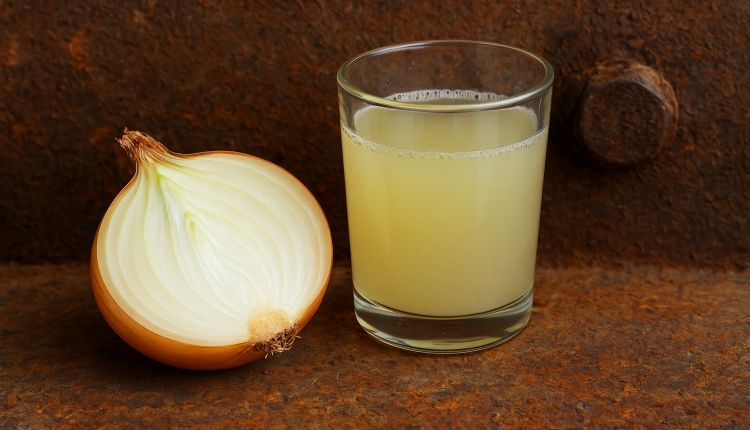Onion Juice: A Natural Solution Against Rust and Mold for Metal Surfaces
Household cleaning is often associated with powerful chemicals, sprays, and solutions that promise fast results. However, many of these commercial products contain substances that are harsh for the environment, irritating for the skin, and sometimes even damaging to the very surfaces they are supposed to protect. In the search for safer and more sustainable alternatives, natural remedies have received growing attention. Among them, onion juice stands out as a surprising yet highly effective option, particularly when it comes to dealing with rust and mold on metallic surfaces. This humble vegetable, present in nearly every kitchen, holds properties that make it not only a culinary essential but also a valuable tool for household maintenance.
The Science Behind Onion Juice
Onions contain sulfur compounds, flavonoids, and natural acids that give them their characteristic pungent aroma and flavor. These same compounds also have antimicrobial and antioxidant properties, which contribute to the effectiveness of onion juice in cleaning. When applied to rusted metal, the acidic nature of onion juice helps break down iron oxide (rust), loosening its grip on the surface and making it easier to wipe away.
For mold, the sulfur compounds act as natural antifungal agents. Mold spores are sensitive to acidic and antimicrobial environments, and onion juice creates conditions that inhibit their growth. This makes onion juice not only a cleaning aid but also a preventive measure against future infestations.
Onion Juice Against Rust
Rust is one of the most common problems for metal surfaces exposed to moisture and air. From kitchen knives to garden tools, bicycles to bathroom fixtures, rust can cause damage that reduces functionality and shortens lifespan. Many commercial rust removers use strong acids that can corrode metal if applied carelessly.
Onion juice provides a gentler alternative. By cutting an onion and rubbing it directly onto a rusted surface, or by applying fresh onion juice with a cloth, the compounds penetrate the rust layer. After letting it sit for a period of time, the rust begins to loosen, and gentle scrubbing with a brush or cloth removes the residue. Unlike harsh chemicals, onion juice does not damage the underlying metal and leaves no toxic residue behind.
Gardeners have long known this trick for maintaining tools such as shears and spades. A quick rub with onion not only removes minor rust but also provides a thin protective layer against further oxidation. Similarly, kitchen knives regain their shine when treated with onion juice, without the risk of contaminating food with chemical residues.
Onion Juice as a Mold Fighter
Mold is a persistent problem in damp environments, whether in basements, bathrooms, or on outdoor furniture. Many household molds release spores that can cause allergic reactions, respiratory problems, and unpleasant odors. Conventional mold removers often rely on chlorine-based chemicals that can irritate the lungs and bleach surfaces.
Onion juice presents a safer alternative. Its antifungal properties target mold colonies directly. By applying fresh juice to moldy areas and allowing it to sit, the growth weakens and can be scrubbed away more easily. For prevention, periodic wiping of vulnerable surfaces with onion juice reduces the likelihood of mold taking hold.
While onion juice may not bleach dark stains left by long-standing mold as strongly as chemical cleaners, it excels as a maintenance solution. Regular use prevents mold from establishing colonies, which makes it especially useful for households aiming to reduce chemical exposure.
Practical Applications
The versatility of onion juice makes it a practical solution across various settings. In the kitchen, it helps keep stainless steel utensils and knives free from rust. In the garage, it restores metal tools, bolts, and even bicycle chains. Outdoors, it can be used on garden equipment or metal furniture prone to rust or mold from weather exposure.
Applying onion juice is straightforward. Simply cut an onion in half and rub it directly on the surface, or blend an onion to extract juice and apply it with a cloth or brush. For heavier rust or mold, allowing the juice to sit for 15–30 minutes before scrubbing enhances effectiveness. Rinsing with water afterward removes residue and smell, leaving the surface clean and refreshed.
Environmental and Health Benefits
Choosing onion juice over chemical cleaners aligns with sustainable living. It reduces the release of harmful substances into water systems, lowers household chemical exposure, and repurposes a common food ingredient for cleaning. For families with children or pets, this natural method provides peace of mind, as accidental contact with onion juice is far less hazardous than with conventional cleaners.
Additionally, the simplicity and low cost of onion juice make it accessible to everyone. It does not require specialized products or complicated preparation. A single onion can serve both in cooking and cleaning, bridging practicality with eco-consciousness.
Limitations and Considerations
While onion juice is effective for light to moderate rust and mold, it may not be strong enough for severe cases that require industrial-grade solutions. For antique or highly valuable metal items, professional restoration may still be necessary. Furthermore, onion juice has a strong odor that some may find unpleasant, though this usually dissipates after rinsing.
Despite these limitations, onion juice remains a highly effective option for everyday cleaning tasks. Its ease of use, safety, and accessibility make it a practical addition to natural cleaning practices.
Conclusion
Onion juice is much more than a kitchen staple—it is a versatile and eco-friendly cleaning solution. Its natural acids and antimicrobial compounds effectively fight rust and mold, making it especially useful for maintaining metallic surfaces in kitchens, gardens, and households. By incorporating onion juice into cleaning routines, individuals can reduce reliance on harsh chemicals, protect their health, and contribute to a more sustainable environment. This simple yet powerful remedy demonstrates that sometimes the best solutions are those already waiting in our pantry.

